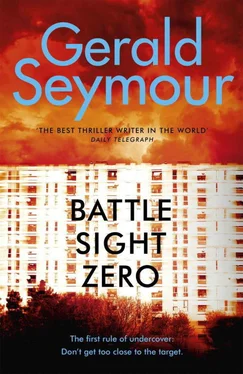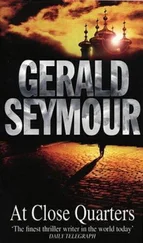Hamid broke the surface. The flashlight’s beam was many metres away. He tried to shout, could manage only a choking cough, and he reckoned the boat was moving away. If he did not cling to the package then he would have to face Tooth, explain, see his life distroyed. He was sure of it, as he drifted farther from rescue, from the torch’s reach, and they seemed not to hear him. The weight of the bag increased and he needed more strength to hold on to it.
He thought himself going, did not know how much longer he would be able to last.
Karym eased out from La Castellane on his scooter. There was good trade that night, and taxis brought buyers to the entrance off the Boulevard Henri Barnier, and waited for clients to be taken into the depths of the blocks, to be supplied, and to pay in old notes, emerge and be driven away.
He left the project, and headed off down the road towards the lights of Marseille.
The instructions he had been given had been memorised, had then been burned. Anxious to please his brother, who had shown some small faith in his ability, he left early, gave himself time.
He woke.
He had always slept well, at school, at Lympstone. Before exams he had been dead to the world whether it was in the struggle for school results or getting through the tough examinations for the marksman’s rating, and when he had been on the induction course for the police SC&O10 unit. Not now… had not slept fully as Phil or Norm or Andy: never lasted a night, was up and dressed, whether a courier driver or a jobbing gardener or driving a heavy goods vehicle, by six or earlier. It meant that a situation could alter without notice. He did not carry a weapon. Nothing he could reach for. His eyes open, he lay rigid, held his breath and listened. He expected to hear her breathing. He had to know where he was, why he was there, with whom. Easy enough to forget ‘where’ and ‘why’. He might have grimaced, because it had been good: she was a new experience in his confused and nameless life. No breathing beside him but he could make out the sounds of the night: occasional vehicles, the grind of an engine that powered, probably a street cleaning truck… and still at it on the floor above. Heard all that, did not hear her breathing.
He reached across. His hand did not touch her shoulder, nor her waist, nor the expanse of her back. He groped further. The sheet was folded back on her side. He sat up, alert, and eyed the bathroom door. No light under it… in the Marines, with the reconnaissance teams, with the unpredicted – behind the lines and without close support – they called it ‘a train wreck’… No sound from the bathroom.
And heard her. A few words. She had barely said a word when she had been in his arms, under him or over him, fitting the rubber and… had hardly spoken, allowed only short, sharp squeals, not simulated. Recognised her voice, and heard also someone who struggled to put together a sentence in English but tried. He slipped off the bed.
‘You want to come, why not? You see the real Marseille. I can do that.’
He saw a slight young man, grubby clothes that were the imitation of something smarter, and saw the acne scars on his face, and saw a scooter beside him and one arm seemed strong and took the weight of the machine, and the other looked weak. The light was full on the boy and his eyes were bright, and he grinned, and reached out with his damaged arm
She hesitated. ‘There’s a man upstairs, he’s sleeping, he’s…’
She was half dressed, he reckoned. Most of her clothes were still in the empty bathroom. Just wore her jeans and trainers and a T-shirt, and her arms were folded across her chest, as if for warmth, and avoiding the wind that flicked rubbish in her face.
‘You have a boy to fuck you? That’s good. Will he beat you if you come with me and see where I live, the true experience of Marseille? Will he?’
‘No, he will not. He thinks he loves me. I do not have to explain, I…’
‘But you do have to trust. That’s good, trust. You have to trust me, it is necessary. I would like to show you where I live, and show people there that a woman comes to see me, my guest, a beautiful woman – please.’
‘Why not? Yes. I have to be back before he wakes.’
‘You have made him tired?’
She giggled, the guilty girl and proud of it. Her head was back and she stifled laughter. She swung her leg, was astride the pillion. The boy used his feet to push the scooter across to the far side of the square, then the engine snapped alive, and the last Andy saw of her was through a haze of fumes coming from the exhaust.
He was supposed to be close to her, and again he had failed. He dressed, as she had, jeans and a shirt and trainers, and what they had done together – and what was done above them – had dulled his head, and he felt cursed.
He had been barely conscious when they heaved him out of the sea.
If he had been able to shout, the rescue might have been quicker. He could only croak. It could have been that the fisherman had realised the risk of going back to the harbour without him, leaving his son to rope up the boat and swab the decking of the passenger’s vomit, and gone to the parked car and ducked his head in respect to the man who’d have lowered his window – and apologised, and said that there had been a misfortune, an accident, a loss. The loss of the passenger, and the loss of a cargo. Could have been that the search had only continued for so long because the fisherman dreaded that admission. Instead, Hamid received help from the fisherman and his son as he stepped off the boat, on to the rocking pontoon. One on either side of him, taking his weight. They would have carried the packet had he allowed it.
At first Hamid had bobbed in the water, strong enough to stay upright, his head clear and his body lifted by the waves then dropped into troughs. The salt taste had stuck in his throat but he had lost the will to try to hack it out, cough it clear. The great bulk of the freighter had disappeared within moments, but the torchlight search from the fishing boat had been obvious. He’d heard them shout for him: didn’t know his name but yelled into the night, into the wind and the waves. And, neither of them had explained about the life-jacket, had told him that it carried both a whistle and a beacon light on straps to be tugged… It was fear of the small man with the trimmed beard, Tooth, that kept him alive, as if he believed that he could still be hurt, face retribution, even when dead, drowned, his lungs emptied of air, filled with seawater.
His grip on the package had never loosened.
They had brought him into the boat after sticking a hook, fastened with whipping to a long pole, under the straps of the jacket. The fisherman had brought him to the boat’s side, and his son had leaned out and clasped the package, then had tried to free Hamid’s hand from the plastic. He had not released his grip, nor had he done so when back in the boat. Water cascaded off him and chilled his skin, and his clothes and shoes were sodden weights. He had not allowed them to break his hold on the plastic bag. They gave him coffee from a flask, then poured brandy from a bottle into the flask and gave him more, and he spluttered as the warmth ran like fire in his throat.
He managed the pontoon, then shook them clear. He walked in a good line towards the car and the headlights came on. If they blinded him he did not show discomfort. The window came down. He heard the gravel voice, and the question.
‘It was in the sea?’
‘And I went in after it.’
‘You dived for it?’
‘Before it sank.’
Only then did Hamid free his grip on the bag. Tooth, the great man, was out of the car, at the boot, took the package, then drained off the water, took a towel from the back of the baggage area.
Читать дальше












